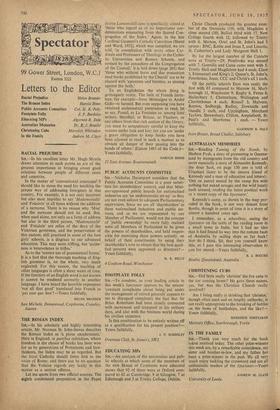THE ROMAN INDEX
SIR,—In his scholarly and highly interesting article, Mr. Norman St. John-Stevas describes the Roman Index as 'a pious anachronism.' Here in England, in partibus infidelittm, where freedom in the choice of books has been won for us by generations of Protestants and free- thinkers, the Index may be so regarded. But the loyal Catholic should listen first to the voice of Rome; and there can be no question that the Vatican regards any laxity in this matter as a serious offence. decree Lantentabili sane is spocifically aimed at 'those who regard as of no importance con- demnations emanating from the Sacred Con- gregation of the Index.' Again, in the late Cardinal Gasparri's Catholic Catechism (Sheed and Ward, 1932), which was compiled, we are told, 'in consultation with many other Car- dinals and Professors of Theology in the Catho- lic Universities and Roman Schools, and revised by the consultors of the Congregation of the Council,' it is laid down (page 201) that 'those who without leave and due precaution read books prohibited by the Church' arc to be classed with 'apostates and heretics, as sinning against the faith.'
To an Englishman the whole thing is grotesquely comic. The bulk of French litera- ture, for example—from Montaigne to Andre Gidc—is banned. But even supposing you have obtained ecclesiastical permission to read, let us say, Pascal, or La Fontaine or, among later writers. Stendhal. or Balzac, or Flaubert, or any others from that rich section of the library, you must he scrupulously careful to keep the volume under lock and key; for you are 'under a grave obligation to keep books you have been allowed to read in such a manner as to obviate all danger of their passing into the hands of others.' (Canon 1403 of the Code.)— Yours faithfully, HAROLD BINNS
21 East Avenue, Bournemouth










































 Previous page
Previous page